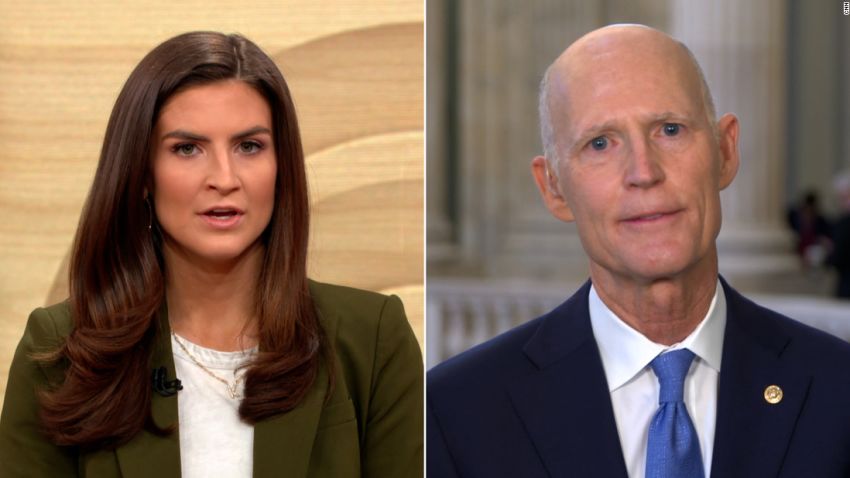In his latest move to differentiate himself from House Republicans on entitlement programs, President Joe Biden is making a pretty big promise.
He is vowing to shore up the shaky finances of Medicare’s trust fund, extending its solvency to the middle of the century instead of the expected depletion date of 2028.
“I will not cut a single Social Security or Medicare benefit. In fact, I’m going to extend the Medicare trust fund for at least two decades,” Biden said Thursday in a speech in Florida, echoing similar comments from his State of the Union address earlier in the week.
But just how he will accomplish this objective – as well as one to strengthen Social Security – remains to be seen.
Other than repeating his common refrain of making the wealthy and big corporations pay more, he has yet to outline a vision for securing the entitlement programs. It’s a goal that has eluded many presidents and lawmakers before him, and the divided Congress will make it that much more difficult to accomplish.
Asked for more information, the White House said, “We will provide more details on March 9, when the president releases his budget, backed up by full, transparent accounting.”
Pressed about his plan, White House press secretary Karine Jean-Pierre told reporters Thursday that she’s “just not going to get ahead of what the president is going to lay out on his budget.”
Biden is touting many of the financial benefits for Medicare enrollees in the Inflation Reduction Act, which Congress passed last summer. The law aims to reduce seniors’ drug costs and is expected to produce savings for the federal government. But it will not help Medicare’s troubled hospital insurance trust fund, known as Medicare Part A, which pays for services such as inpatient hospital care.
The trust fund will only be able to pay scheduled benefits until 2028, according to the most recent Medicare trustees report. At that time, the fund’s reserves will be depleted, and Medicare’s revenues will only be able to cover 90% of total benefits.
Longtime Medicare and Social Security advocates are very interested in learning more about Biden’s strategy to protect the entitlement programs, particularly how he would extend Medicare’s solvency for at least two decades.
“I haven’t seen a plan that does that,” said Bill Sweeney, AARP’s senior vice president of government affairs. “Our members will be eager to see what the approach is there.”
Tall order on Medicare
A president’s budget is an aspirational accounting of the policy priorities he wants lawmakers to take up. Congress is not required to follow its provisions, and often doesn’t, though lawmakers may look to it as a guide.
Based on his State of the Union address, Biden will presumably include tax measures in the budget that will add new revenue to the Medicare trust fund, said Matt Kazan, a managing director at Avalere Health, a consulting firm.
It could involve changes to the Medicare payroll tax of 2.9% of earnings, split between workers and their employers. Or it may entail other new tax policies that would funnel money to the trust fund, Kazan said, pointing to two levies passed as part of the Affordable Care Act in 2010.
Another unknown is whether Biden also plans to include non-tax provisions aimed at improving Medicare’s fiscal health in his budget.
“Extending solvency by more than two decades would likely require substantial changes in policy or a series of small, but still serious, changes,” said Kazan, who spent more than a decade as a senior health policy adviser for Democrats on the Senate Finance Committee.
Addressing Social Security’s trust fund woes
Social Security is also in bad fiscal shape. The combined Social Security trust funds – which help support payouts for the elderly, survivors and Americans with disabilities – are projected to deplete their reserves in 2035, according to the most recent Social Security trustees report. At that time, the program’s income will only be enough to cover 80% of scheduled benefits.
This year, workers will pay 6.2% on the first $160,200 of their wage and salary income into Social Security. Their employers match that amount.
A wide range of proposals have been floated over the years to shore up Social Security’s finances. Some focus on raising more revenue by changing the payroll tax that supports the entitlement, while others look to limit benefits in various ways, including raising the full retirement age or curbing payments for higher-income earners or future retirees.
“Everyone says I’m for that, I’m for Social Security,” said Max Richtman, CEO of the National Committee to Preserve Social Security and Medicare, who opposes any benefit cuts. “But it’s when you get into some of the details that it gets complicated.”
Some lawmakers have floated the idea of levying the payroll tax on higher income earners. For instance, Democratic Rep. John Larson of Connecticut would impose it on earnings above $400,000 – which would be in keeping with Biden’s pledge not to raise taxes on those below that threshold.
During his 2020 presidential campaign, Biden said that he would put Social Security “on a path to long-term solvency by asking Americans with especially high wages to pay the same taxes on those earnings that middle-class families pay.” In addition, he proposed a variety of benefit enhancements, including higher payments for very old retirees, surviving spouses and low-income workers.
Nancy Altman, president of advocacy group Social Security Works, is waiting to see a more specific plan from Biden.
“The administration has not laid out something that can be converted into legislation and introduced in Congress,” Altman said. “So that’s what I’m hoping he will do.”





